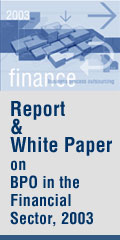|


|
Fitch affirms ICICI ratings, but says it remain vulnerable to market disruptions
November 19, 2008: Fitch Ratings has affirmed ICICI Bank Ltd.'s (ICICI) Long-term Foreign Currency Issuer Default Rating (IDR) at 'BBB-' (BBB minus), Short-term Foreign Currency IDR at 'F3' and Support Rating Floor at 'BBB-' (BBB minus). Simultaneously the Individual rating and Support ratings were affirmed at 'C' and '2', respectively, although both these ratings face downward pressure. The agency has also affirmed its Long-term senior debt rating at 'BBB-' (BBB minus) and Long-term rating of its perpetual hybrid debt and Upper Tier 2 subordinated debt at 'BB'. The Outlook is Stable.
The Individual rating may be downgraded if the bank's asset quality, which is already showing signs of weaknesses, deteriorates significantly more than anticipated, at this current juncture. This may put further pressure on the bank's funding, particularly for its growing international business, where market borrowings have a relatively large share and refinancing risk has already increased steeply, possibly leading to a liquidity problem. At present, such risks seem to be contained, partly due to the foreign currency liquidity offered to Indian banks by the Reserve Bank of India, leading to the affirmation of its Individual rating.
The Support rating may also come under pressure, should the ability of the provider of support, the Indian sovereign, ('BBB minus' (BBB minus), Local currency Outlook Negative) in an extreme situation, were to weaken in future. At present, ICICI's Support Rating Floor remains unchanged at 'BBB-' (BBB minus) and its Long-term IDR Outlook is currently Stable, but as previously noted, the downside risks have become more pronounced.
In Fitch's opinion, ICICI Bank enjoys strong support from the government (subject to the constraints imposed by India's own sovereign rating) thanks to its systemic importance as India's second largest domestic bank, and its long-term rating is also at its Support Floor. Although the bank's financial profile has weakened over the past year or so, and its performance has been affected by rising provisions in both its loans and investment portfolio, its overall financial condition still remains adequate. In particular, the bank's capital ratios were still quite strong (Tier-1 ratio: 11% and Total CAR: 14% as at September 2008) due to an infusion of common equity of about USD5bn in mid-2007. Furthermore, the quality of capital was also strong with hybrid Tier-1 securities constituting only about 7% of the bank's Tier-1 capital. The relatively strong loss absorption ability, together with the strong diversity in the bank's interest and fee incomes, is expected to provide greater resilience to ICICI to negotiate a downturn in the economic cycle.
The near-term challenge for ICICI however, is to overcome the shrinking funding options, particularly in foreign currencies for its international business. While the bank's existing contractual foreign currency capital market bonds repayment during the next two years can be met from its internal liquidity if necessary, the bank remains vulnerable to market disruptions given the higher proportion of wholesale funds (including in its domestic business) that it relies on. Although the share of customer deposits in the bank's UK and Canada subsidiaries have grown impressively, the UK subsidiary has been affected by rising actual and mark-to-market provisions in its investment portfolio, which resulted in a loss during H12009. More write-downs and continued market turmoil have the potential to further impair confidence, and in an extreme situation, even damage ICICI's deposit base in its international subsidiaries.
In line with a gradually deteriorating macro economy, but due more to its own aggression in certain consumer business segments, ICICI's asset quality has been deteriorating over the past year or so, particularly in the consumer loan portfolio (55% of total loans) that had grown rapidly between FY04 and FY08. Its gross NPL ratio at 4% at end-September 2008 was the highest amongst its peer rated banks in India. This ratio may further worsen given the slowdown in economic growth over the next year or two, particularly if exposures to the corporate sector are also affected. However, the bank's loan loss coverage of 58% at end-Sept 2008 and high capitalization resulted in its net NPL to equity ratio to be still fairly low (about 9% at end-September 2008), providing some cushion before the bank's solvency is compromised in a significant manner; notably the bank has slowed down growth in its consumer loans for about a year which may somewhat mitigate the deterioration in its asset quality in future. Therefore, from a fundamental standpoint, ICICI's financial condition still remains adequate, although its less stable funding profile and an aggressive pursuit of growth in the last 5 - 6 years, makes it more vulnerable to market disruptions.
ICICI's network of 1,300 branches and nearly 4,000 ATMs is spread across India, while its international operations are primarily in Asia, the UK, US and Canada.
(This is the press release of Fitch Ratings)
CLICK FOR SPECIAL SECTION ON GLOBAL FINANCIAL CRISIS
CLICK FOR SPECIAL SECTION ON GROUP OF TEWNTY (G-20)
India's Ratings Maintained by S&P on Growth Outlook
Global real credit growth to halve this year
Government measures should stabilize global banking markets
IMF Welcomes Comprehensive European Response to Financial Crisis
IMF sees heightened risks to global financial stability
Global banking industry to see more restructuring & consolidation
Indian Banking sector challenged by domestic, not global, factors
Indian banking system is stable and sound, says RBI Governor
Indian Government sets up group to assess liquidity requirements
US Financial Crisis to indirectly impact Asian banks
Subprime Crisis: A Special
CLICK FOR MORE FEATURES & STORIES
|
|
|


